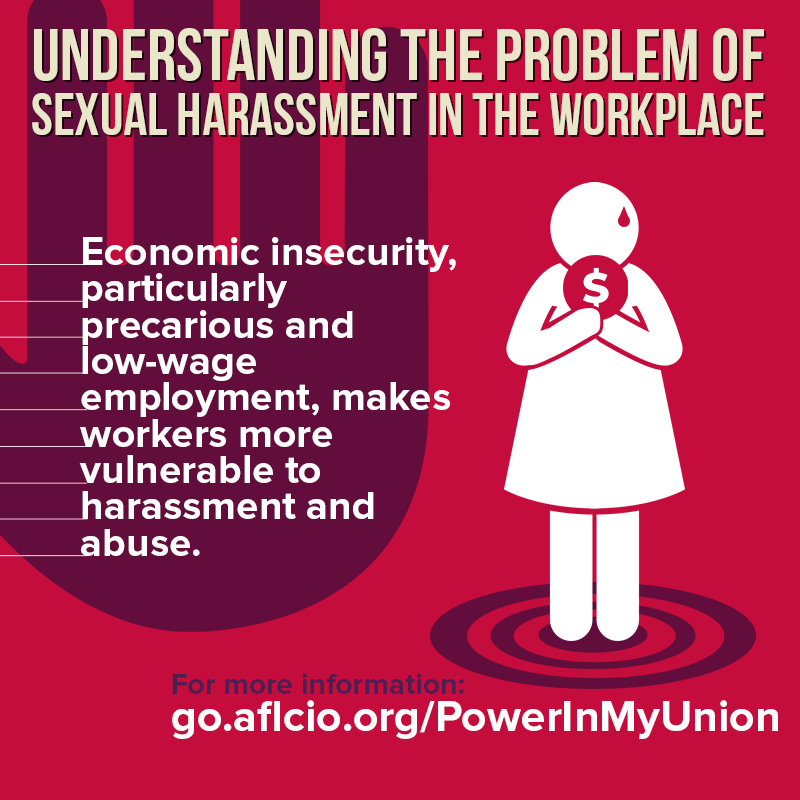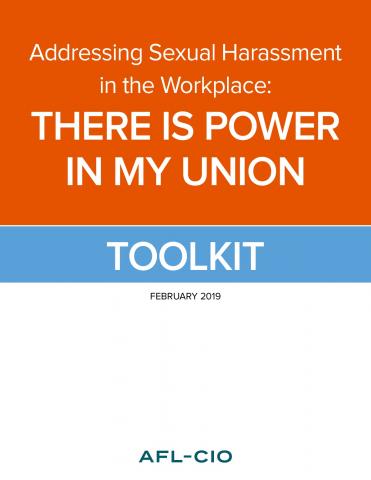Sexual harassment has no place in our society, much less in our workplaces. Yet far too many working people--many of them women--go to work in dread, wondering if they’ll be harassed or worse, and fearing retaliation for speaking up.
The AFL-CIO is dedicated to preventing harassment, assault and other unwanted behavior through education and enforcement of strong policies, and by fostering workplace cultures that support working women and men.
Unions are one of the best ways for working women and men to vanquish harassment and discrimination from their workplaces.
- Do women in all occupations and industries face sexual harassment?
- How does having a union help stop sexual harassment?
- Do working people in unions face less retaliation for addressing harassment?
- How are harassment claims handled in a unionized workplace?
- How do unions help hold employers accountable?
- How do unions advocate for policy solutions to stop harassment?
- What should I do if I don't have a union at work?
-
Do women in all occupations and industries face sexual harassment?
As recent events have highlighted, sexual harassment—unwanted touching, sexual comments, requests for sexual favors and even sexual assault—is a pervasive problem in the workplace. Women in all occupations and industries face sexual harassment, but women in traditionally male-dominated occupations, such as construction, and women in low-wage service industries, face an even greater threat.
-
How does having a union help stop sexual harassment?
A union represents the collective power of workers in the workplace. Given that sexual harassment is an abuse of power, often by a male manager against female subordinates, having a union and therefore collective worker power strengthens a worker’s ability to stop harassment. An individual facing sexual harassment is not alone.
-
Do working people in unions face less retaliation for addressing harassment?
Working people with a union are better able to raise and address harassment concerns because collective bargaining agreements provide more avenues for reporting and increased protection from firing and retaliation than are available to most non-union workers. So if harassment or retaliation does occur, individuals have mechanisms to challenge unjust employer actions, like illegal retaliation for reporting harassment.
-
How are harassment claims handled in a unionized workplace?
The collective bargaining agreements negotiated by workers and their unions with employers typically contain language calling for dignity and respect at work and often include additional anti-discrimination language. These contractual provisions are enforced through a grievance and arbitration process at the worksite—a process typically far quicker and less expensive than outside legal proceedings. (Workers retain the ability to file a discrimination charge with the U.S. Equal Employment Opportunity Commission or relevant state or local agencies.)
-
How do unions help hold employers accountable?
Unions help hold employers accountable for their responsibilities. Employers have a legal duty to prevent sexual harassment. When there is a union, workers can hold employers accountable through the enforcement of anti-discrimination and anti-harassment language in collective bargaining agreements and can better advocate for broad anti-harassment policies and training for managers.
-
How do unions advocate for policy solutions to stop harassment?
Unions advocate for policy solutions to stop harassment in all workplaces, not just union workplaces. As part of its “Hands Off Pants On” campaign, UNITE HERE, the hotel workers’ union, won an ordinance in Chicago and other cities requiring hotels to provide panic buttons to housekeepers so they can sound the alarm if they face harassment on the job from hotel guests or others.
-
What should I do if I don't have a union at work?
Even without a formal union, the law protects individuals when they act together as co-workers to improve their working conditions, including when they come together to stop harassment, or to demand that the employer adopt a policy or conduct sexual harassment training. The National Labor Relations Act protects workers engaged in collective action, regardless of whether they have a union or are trying to form one.
Working women who want to prevent harassment on the job have more avenues for recourse with a union.
They also are more likely to receive higher and more equal pay, better health care and pension benefits, and greater protections against unfair treatment on the job. The law gives workers the right to decide whether to form or join a union without retaliation by their employer.
For more information about unions and their work to address sexual harassment.
For more information about sexual harassment at work.



